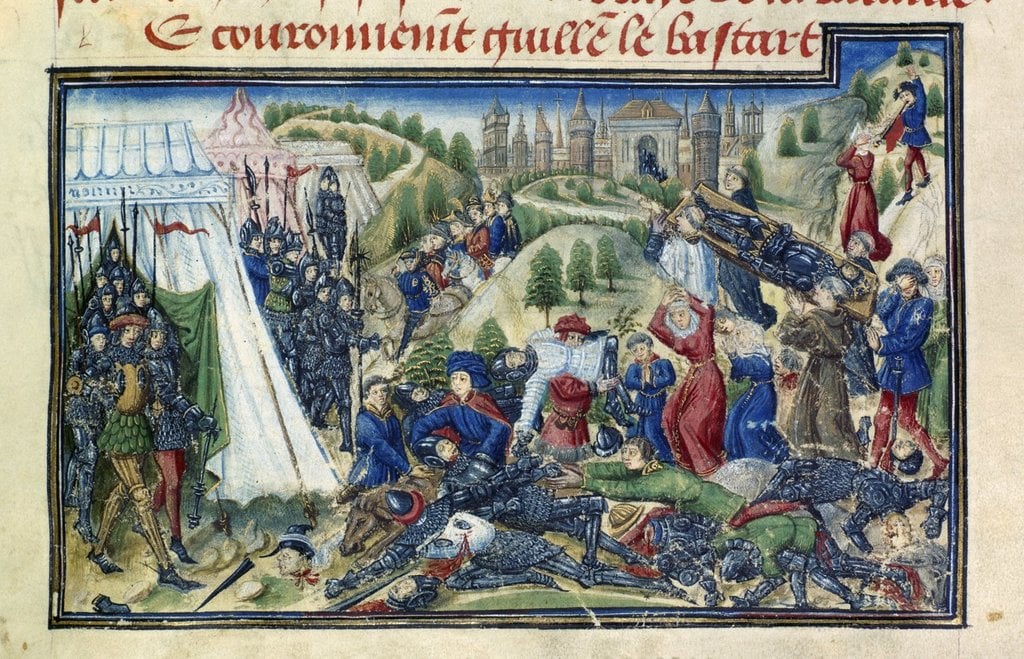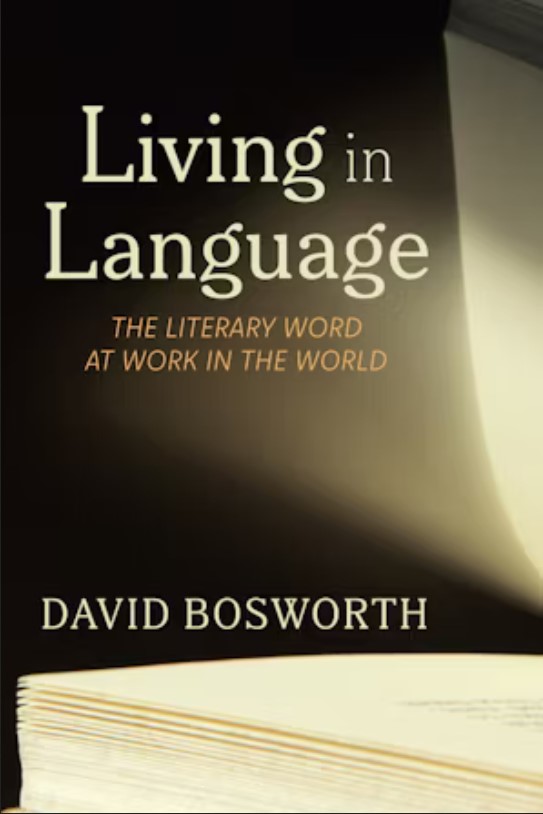This is an excerpt from David Bosworth’s new book Living in Language: The Literary Word at Work in the World, published by FPR Books. Enjoy the essay and pick up a copy of his book.
“This Day in History” October 14, 1066: King Harold II of England [was] defeated by the Norman forces of William the Conqueror at the Battle of Hastings fought on Senlac Hill…. At the end of the bloody, all-day battle, Harold was killed—shot in the eye with an arrow, according to legend—and his forces were destroyed. He was the last Anglo-Saxon king of England. —@History.com
Near the start of his fifty minute talk on postmodern fiction, the lecturer paused, and supplying perhaps some prefatory context for his thoughts to come, he said to us then with a knowing smile: “If I had a half-hour, I could prove to you that language only refers to itself.” That assertion made, our learned guest, a professor of French at a prestigious private school, pivoted back to the topic at hand by parsing a novel whose many words, in a notable feat of monastic restraint, never included the letter e.
The audience was small: to leave would seem rude. And so it appeared, from my conspicuous seat in the second row, that I would have the time, a half-hour at least—while our speaker lightly glazed with ironic praise more self-referential works of prose—to weigh the claim he hadn’t proved.
Unschooled by theory, so many, it seemed, had been so wrong. The list was long and would have to include every oral tribe who strove so hard to marry each word in its native tongue to the feature it best fit—whether rock or river, otter or ox—in the natural world. I thought of all their prayers and pleas, their carefully composed poems of praise or woe, and of those dire distinctions that each group made between the sounds of the sacred and those of the profane, with punishments in place for speaking out of bounds. I remembered, too, how Inuit midwives would call out names, seeking that one-and-only word, which, they knew—or thought they knew—would beckon each baby out of its womb. What a waste, all that ardor spent on superstitiously matching our verbal abstractions to the tangible assets of what proves to be instead an unnameable world—what a squandering of wit and will. A sad assessment, but apparently true now that we knew that language only refers to itself.
In the beginning was the Word? . . . not really, it seemed. And thinking then in biblical terms as I shifted in my seat, I recalled those scriptural accounts of a Middle East little changed in three thousand years—then as now a land that seethed with fratricidal rage. Even “the seed of Abraham,” who shared a tongue and a jealous God, had too many separate, feuding tribes. I recalled in particular how the soldiers of Ephraim were said to be slain by their close Hebraic cousins from the land of Gilead. And how, while trying to sneak away from their battlefield defeat, the survivors were challenged by enemy guards at every ford in the River Jordan. I recalled how they were made to speak then a single Hebrew word, and how that was a test that these desperate imposters, otherwise indiscernible in speech or cast from those who quizzed them, couldn’t quite pass. And when I recalled that shibboleth meant “a stalk of grain,” I was appalled at how the verbal sign for what was, after all, the very source of civilized life ironically became the final word that each would speak.
Ignoring the lecture, picturing instead that long-ago scene, I shivered in my seat at its implications. To think that it only took this much, a demiquaver of difference in pronunciation, hissing where their tribal enemies hushed, to unleash the swords that cut their throats, each and every one . . . the blood of Ephraim, 42,000 husbands and sons, staining that holy river red. Clearly they didn’t know, those feuding “people of the Lord”—those farmers turned to soldiers, those password police guarding each ford—that language only refers to itself.
But as I glanced around the hall at the gathered few, it occurred to me that our postmodern group was not so different, after all. I thought of a young couple I knew and the wedding vows they had so earnestly composed. I thought of all the many promises that each of us makes—to call, to care, to arrive on time; and of the formal contracts we’re given to sign, for loans, for jobs, and of the subsequent sorties of legal indignation when one of the parties has “failed to comply.” I thought of judges and juries carefully assessing what each witness says, and of the intimate whispers of weary fathers reassuring their daughters as they tucked them into bed.
Graver still, I thought of the slang of corner gangs and the threat to passersby who couldn’t comprehend their cryptic codes of disrespect—recalling then, too, those comic nicknames, inside jokes, that bound as one the members of other, less menacing cliques and clubs. I thought of the women I knew who, rereading Jane Austen, still hoped to be wooed by the old formulaic professions of love, and how they weren’t alone. For even as we sat there, millions elsewhere were turning pages, scrolling down screens, sifting through poems and other novelists’ scenes for nuggets of meaning, models of feeling—worlds made of words to inspire or console. All leading me to ask if anyone I knew actually behaved as if they believed the lecturer’s claim.
Certainly not that boy I had recently seen jump from his car and onto a curb; how he stood there exposed, in t-shirt and jeans, equally unaware of the evening’s freezing rain and the unmanly shame of his needy pleas, while shouting at a house: Mandy, come out, come out! Mandy, come out! If only he had known that Mandy’s words of rejection, whether mocking or meek, had been referring to themselves and not to his hopes of being held close on a wet winter evening.
And then I was struck by an odd association, the abstract claim of the lecturing theorist resurrecting in my mind a singsong rhyme from grammar school days: all those times we were told sticks and stones may break my bones, but words will never hurt me. Now I have to ask, though, what I never did back then: which belittled kid, weeping in the dirt by a jungle gym, ever believed that peacekeeper’s lie? Who hasn’t learned by the age of five that, just as we crave to be touched and are sometimes punched, we live to be told that we’re liked or loved only to risk being cursed or mocked.
And staring at our guest, I was tempted then to test him. Just how would he respond if, interrupting his talk, I hurled some verbal sticks and stones at him, yelling at him then: You’re full of shit, you pretentious dick! You derivative, status-grubbing, Frog-loving twit! Reminding him then if he bristled or flinched: Hey, dude, no offense meant; no harm, no foul to one-and-all when language only refers to itself.
Ten minutes to go, and as I shifted in my seat, the air seemed to roil in sonic revolt. The words themselves rebelled against the man who spoke them, reasserting then, if only to those ready to discern it, the story of their origins in other times and places—in Danish marshes, Spanish mansions, in slave-tilled fields and oppressive factories. In my archeologist’s ear, it seemed that I could hear the hybrid evolution of the language that we shared, all its fusions and fractures—some words expunged, others torn from foreign shores and rudely worn like looted rings on Vikings’ thumbs. I recognized then all the booty of battle and of exploration, the pidgin of trade and of illicit love, strangers then exchanging not just goods and genes but alien words, which mated then with other words, so many mongrel terms quickly put to use to sieve and hold, like nuggets veined with gold, the metamorphic features of our otherwise inconceivable world.
Our speaker didn’t seem to know that, beneath the precious mask his theory wove, the very sounds he spoke were pulsing with the passions of past events. He couldn’t sense, as I could then, all the living that infused the language that he used: the rage for order, the hunger for more, the all-enduring grief that revived the dead on the ghostly breath of holy verses. Deaf to our dependence on the sins and suffering of those who came before us, our lecturer couldn’t catch, as I did then, the subliminal sounds of long-ago incursions, each Anglo-Saxon word he said a fricative sledge crushing the skull of a Celtic farmer.
And yet, I’m sorry to confess, I said none of this then. Instead, a choice I’ve long regretted, I fled as soon as the lecture ended. And so to make amends, here it is now, the climax to my belated reply—what I should have but didn’t say during the Q & A that followed your talk, sir. Although I don’t “do theory” or earn my living declining French verbs for the well-endowed, I have acquired an ear, equally armed with gratitude and fear, for the presence of the past in the English that we do share.
Which is why I don’t intend to end by mustering a set of abstract proofs. Instead of arguing with you, I’ll only testify now to what I heard resounding in your words on that autumn afternoon. First, the drumming of hooves on a field near Hastings. Then the clangor of axes battering shields. Then the terrible plucked chord of a thousand Norman bowstrings set loose at once. And then, moments later, the eerie whistle of their missiles as they bolted down, followed by the sound of a single final jolt.
Almost a thousand years old, this is the news that, staying news, reemerged that day from your lecturing mouth. I heard it then, followed by a man’s agonizing cry. I hear it now in every Franco-Norman word we unknowingly pronounce: that arrow piercing King Harold’s eye.
Image via Picryl






1 comment
Kate Dalton Boyer
What a fine piece. How glad I am that you defaulted to a well-bred if undeserved politeness at this lecture, however long ago, so that the moment grated on your memory and produced this book. I think a lot of us have a great love for our language, and people who would murder both sense and the expression of our own experience certainly deserve to be pilloried–at least–in print.
Comments are closed.